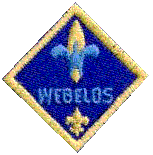Requirements
for rank
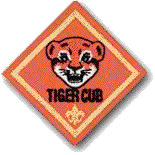 THE TIGER CUB ACHIEVEMENTS
THE TIGER CUB ACHIEVEMENTS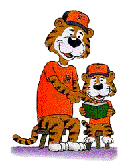
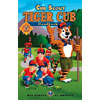
EARNING THE "TIGER CUB BADGE"
F= Family Activity D= Den Activity G= GO SEE activity
Making My Family Special
1F - Think of one chore you can do with your adult partner. Complete it together
1D - Make a family scrapbook
1G - Go to a library, historical society, museum, old farm, or historical building, or visit an older person in your community. Discover how family life was the same and how it was different many years ago.
Where I Live
2F - Look at a map of your community with your adult partner.
2D - Practice the Pledge of Allegiance with your den, and participate in a den or pack flag ceremony.
2G - Visit a police station or fire station. Ask someone who works there how he or she helps people in your community.
Keeping Myself Healthy and Safe
3Fa - With your family, plan a fire drill and then practice it in your home.
3Fb - With your adult partner, plan what to do if you become lost or separated from your family in a strange place.
3D - Make a food guide pyramid.
3G - Learn the rules of a game or sport. Then go watch an amateur or professional game or sporting event.
How I Tell It
4F - At a family meal, have each family member take turns telling the others one thing that happened to him or her that day. Remember to practice being a good listener while you wait for your turn to talk.
4D - Play "Tell It Like It Isn't."
4G - Visit a television station, radio station, or newspaper office. Find out how people there communicate to others.
Let's Go Outdoors
5F - Go outside and watch the weather.
5D - With a crayon or colored pencil and a piece of paper, make a leaf rubbing.
5G - Take a hike with your den.
When you and your boy have followed the five steps of the Tiger Cub, your boy has earned his Tiger Cub badge.
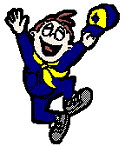 THE BOBCAT TRACKS
THE BOBCAT TRACKS 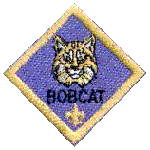
To earn the Bobcat badge the boy must complete these eight tracks of Akela:
LEARN AND SAY THE CUB SCOUT PROMISE
"I ____(name)____ promise to do my best
To do my duty to God and my country,
To help other people, and
To obey the Law of the Pack."
SAY THE LAW OF THE PACK. TELL WHAT IT MEANS.
"The Cub Scout follows Akela.
The Cub Scout helps the pack go.
The pack helps the Cub Scout Grow.
The Cub Scout gives goodwill. "
TELL WHAT "WEBELOS" MEANS.
"WE'll BE LOyal Scouts"
SHOW THE CUB SCOUT SIGN. TELL WHAT IT MEANS.
SHOW THE CUB SCOUT HANDSHAKE. TELL WHAT IT MEANS.
SAY THE CUB SCOUT MOTTO. A MOTTO IS A RULE.
The MOTTO is: "DO YOUR BEST. "
GIVE THE CUB SCOUT SALUTE. TELL WHAT IT MEANS.
With your parent or guardian, complete the exercises in the parent's guide, "How to Protect Your Children from Child Abuse".
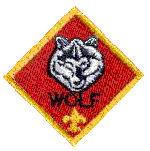 THE WOLF ACHIEVEMENTS
THE WOLF ACHIEVEMENTS 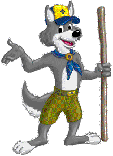
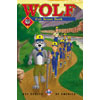
FEATS OF SKILL - Do each of 'a' through 'e' and one of 'f' through 'k':
Play catch with someone 10 steps away. Play until you can throw and catch.
Walk a line back and forth. Do it sideways too. Then walk the edge of a board six steps each way.
Do a front roll.
Do a back roll.
Do a falling forward roll.
See how high you can jump.
Do the elephant walk, frog leap, and crab walk.
Swim as far as you can walk in 15 steps.
Using a basketball or playground ball do a baseball pass, chest pass. or bounce pass.
Do a frog stand.
Run or jog for 10 minutes OR jog in place for 5 minutes.
YOUR FLAG - Do the following:
Give the Pledge of Allegiance to the flag of the United States of America. Tell what it means.
Lead a flag ceremony in your den. See the Wolf Cub Handbook for some ideas.
Tell how to respect and take care of the flag. Show three ways to display the flag.
Learn about the flag of your state or territory and how to display your it. (Revised for 1998)
With the help of another person, fold the flag.
KEEP YOUR BODY HEALTHY - Do the following:
Show that you know and follow the seven rules of health.
Tell four ways to stop the spread of a cold. (Revised for 1998)
Show what to do for a small cut on your finger.
KNOW YOUR HOME AND COMMUNITY - Do the following:
Write down the phone numbers you need to have. Put them by your phone. (Police, Fire, Doctor, Mother at work, Father at work, Family friend.)
Tell what to do if someone comes to the door and wants to come in.
If someone calls on the phone.
When I leave our home I will _____________.
Talk with others in your home about helping. Agree on the home jobs you will do. Make a list of your jobs.
TOOLS FOR FIXING AND BUILDING - Do the following:
Point out and name eight tools. Do this at home, or go to a hardware store with a grown-up. Tell what each tool does.
Show how to use pliers.
Use a screwdriver to drive a screw.
Show how to use a hammer.
Make a birdhouse, a pair of bookends, or something else useful. (Revised for 1998)
START A COLLECTION - Do the following:
Make a collection of anything you like. Start with 10 things. Put them together in a neat way.
Show and explain your collection to another person.
Land, air, and water can get dirty. On a sheet of paper list the ways this can happen. (New for 1998)
It takes a lot of energy to make glass, cans, and paper products. You can help save energy by collecting these things for use again. Write the name of the recycling center closest to you. Find out what items you can save and send to this center. (New for 1998)
With a grown-up, pick up litter in your neighborhood. Wear gloves to protest your hands from glass and other sharp objects. (New for 1998)
With a grown-up, find three stories that tell how people are protecting our world. Read and discuss them together. (Revised for 1998)
Besides recycling, there are other ways to conserve energy. List three ways you can save energy, and do them. (Revised for 1998)
COOKING AND EATING - Do the following:
Study the Food Guide Pyramid. Name some foods from the Food Guide Pyramid from each food group. (Revised for 1998)
Plan the meals that you and your family should have for one day. List things your family should have from the food groups in the Food Guide Pyramid. At each meal, you should have foods from at least three food groups. (Revised for 1998)
Help fix at least one meal for your family. Help set the table, cook the food, and wash the dishes.
Fix your own breakfast. Wash and put away the dishes.
Help to plan, prepare, and cook an outdoor meal.
BE SAFE AT HOME AND ON THE STREET - Do the following:
WITH A GROWN-UP, check your home for things that may help keep you safe.
WITH A GROWN-UP, check for danger from fire.
Practice good rules of street and road safety.
Know the rules of bike safety.
FAMILY FUN - Do the following:
Make a game like one of these. Play it with your family. (Eagle Golf, Beanbag Archery.)
Plan a walk. Go to a park or wooded area, visit a zoo or museum with your family.
Read a book or Boys' Life magazine with your family. Take turns reading aloud.
Decide with Akela. what you will watch on television or listen to on the radio.
Attend a concert, a play, or other live program with your family.
DUTY TO GOD - Do the following:
Talk with your folks about what they believe is their duty to God.
Give some ideas on how you can practice or demonstrate your religious beliefs. (Revised for 1998)
Find out how you can help your church, synagogue, or religious fellowship.
MAKING CHOICES - Do ANY FOUR of these nine requirements:
There is an older boy who hangs around Jason's school. He tries to give pills to the children. What would you do if you were Jason?
Mel is home alone. The phone rings. When Mel answers, a stranger asks if Mel's mother is home. She is not. Mel is alone. What would you do if you were Mel?
Justin is new to your school. He has braces on his legs and walks with a limp. Some of the kids at school tease him. They want you to tease him too. What would you do? (New for 1998)
Juan is on a walk with his little sister. A car stops and a man asks them to come over to the car. What would you do if you were Juan?
Matthew's grandmother gives him money to buy an ice- cream cone. On the way to the store, a bigger boy asks for money and threatens to hit Matthew if he does not give him some money. If you were Matthew what would you do?
Chris and his little brother are home alone in the afternoon. A woman knocks on the door and says she wants to read the meter. She is not wearing a uniform. What would you do if you were Chris? (Revised for 1998)
Sam is home alone. He looks out the window and sees a man trying to break into a neighbor's back door. What would you do if you were Sam?
Mr. Palmer is blind. He has a guide dog. One day as he is crossing the street, some kids whistle to call the dog. They want you and your friends to call the dog too. What would you do? (New for 1998)
Some kids who go to Bob's school want him to steal candy and gum from a store, which they can share later. Bob knows this is wrong, but he wants to be popular with these kids. What would you do if you were Bob?
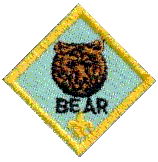 THE BEAR ACHIEVEMENTS
THE BEAR ACHIEVEMENTS 
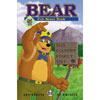
GOD (do ONE of the following)
WAYS WE WORSHIP - Practice your religion as you are taught in your home, church, synagogue, mosque, or other religious community.
EMBLEMS OF FAITH - Earn the religious emblem of your faith.
COUNTRY (do THREE of the following)
WHAT MAKES AMERICA SPECIAL? (Do requirement "a" AND 3 of the rest - (4 total)
Write or tell what makes America special to you.
With the help of your family or den leader, find out about two Americans. Tell the things they did or are doing to improve our way of life.
Find out something about the old homes near the place where you live. Go and see two of them.
Find out where places of historical interest in or near your town are located. Go and visit one of them with your family or den.
Choose a state; it can be your favorite one or your home state. Name the state bird, tree, and flower. Describe its flag. Give the date it was admitted to the union.
Be a member of the color guard in a flag ceremony for your den or pack.
Display the U.S. flag in your home or fly it on three national holidays.
TALL TALES - Do ALL 3 requirements.
Tell in your own words what folklore is. List some folklore stories, folk songs, or historical legends from your own state or part of the country. (See handbook for ideas.)
Name at least five stories about American folklore. Point out on a United States map where they happened. (See handbook for ideas.)
Read two folklore stories and tell your favorite one to your den.
Choose a bird or animal that you like and find out how it lives. Make a poster showing what you have learned.
Build or make a bird feeder or bird house.
Explain what a wildlife conservation officer does.
Visit one of the following: Zoo, Nature center, Wildlife refuge, Game preserve.
Name one animal that has become extinct in the last 100 years. Tell why animals become extinct. Name one animal that is on the Endangered Species List. (Revised for 1998)
TAKE CARE OF YOUR PLANET - Do 3 of the following.
Save 5 pounds of glass or aluminum, or 1 month of newspapers. Turn them in at a recycling center or use your community's recycling service.
Plant a tree in your yard, or on the grounds of the group that operates your Cub Scout pack, or in a park or other public place. Be sure to get permission first.
Call city or county officials or your trash hauling company and find out what happens to your trash after it is hauled away.
Do a water usage survey in your home. Note the ways water is used. Look for any dripping faucets.
Discuss with an adult in your family the ways your family uses energy.
Find out more about your family's use of electricity.
LAW ENFORCEMENT IS A BIG JOB - Do 4 of the following.
Make a set of your own fingerprints.
Make a plaster cast of a shoe print.
Check the doors and windows of your home.
Visit your local sheriff's office or police station.
Be sure you know where to get help in your neighborhood.
Be sure fire and police numbers are listed by the phone at your home.
Know what you can do to help law enforcement.
FAMILY
THE PAST IS EXCITING AND IMPORTANT - Do 3 of the following.
Visit your library or newspaper office. Ask to see back issues of newspapers or an almanac.
Find someone who was a Cub Scout a long time ago. Talk with him about what Cub Scouting was like then.
Start or add-to an existing pack scrapbook.
Trace your family back through your grandparents or great grandparents; or, talk to a grandparent about what it was like when they were younger.
Find out some history about your community.
Write in a journal for 2 weeks.
WHAT'S COOKING? - Do 4 of the following.
With an adult, bake cookies.
With an adult, make snacks for the next den meeting
Prepare one part of your breakfast, one part of your lunch, and one part of your supper.
Make a list of the 'junk' foods you eat. Discuss "junk" food with your parent or teacher.
Make some trail food for a hike. (New for 1998)
Make a dessert for your family.
FAMILY FUN - Do BOTH of these requirements.
Go on a trip with members of your family. (See handbook for ideas.)
Have a "family-make-and-do" night.
BE READY! - Do the first 4; the last one is recommended, but not required.
Tell what to do in case of accident in the home. A family member needs help. Someone's clothes catch on fire. (See handbook)
Tell what to do in case of a water accident. (See handbook)
Tell what to do in case of a school bus accident. (See handbook)
Tell what to do in case of a car accident. (See handbook)
Have a health checkup by a physician (optional).
FAMILY OUTDOOR ADVENTURE - Do 3 of the following.
Go camping with your family.
Go on a hike with your family.
Have a picnic with your family.
Attend an outdoor event with your family.
Plan your outdoor family day.
SAVING WELL, SPENDING WELL - Do 4 of the following.
Go grocery shopping with a parent or other adult member of your family. Compare prices of different brands of the same item. Check the prices at different stores. Read the ads in your newspaper.
Set up a savings account.
Keep a record of how you spend money for 2 weeks.
Pretend you are shopping for a car for your family.
Discuss family finances with a parent or guardian.
Play a board game with your family that involves the use of make-believe money.
With an adult, figure out how much it costs for each person in your home to eat one meal.
SELF (do FOUR of the following)
RIDE RIGHT - Do requirement a and THREE more. (Total of 4)
Know the rules for bike safety. If your town requires a bicycle license, be sure to get one. (See handbook for rules.)
Learn to ride a bike, if you haven't by now. Show that you can follow a winding course for 60 feet doing sharp left and right turns, a U-turn, and an emergency stop.
Keep your bike in good shape. Identify the parts of a bike that should be checked often.
Change a tire on a bicycle.
Protect your bike from theft. Use a bicycle lock.
Ride a bike for 1 mile without rest, and be sure to obey all traffic rules.
Plan and take a family bike hike.
GAMES, GAMES, GAMES! - Do 2 of the following.
Set up the equipment and play any two of these outdoor games with your family or friends.
Backyard Golf
Badminton
Croquet
Sidewalk Shuffleboard
|
Kickball
Softball
Tether ball
Horseshoes
Volleyball
|
Play two organized games with your den.
Select a game your den has never played. Explain the rules. Tell them how it is played, then play it with them.
BUILDING MUSCLES - Do ALL of the following.
Do physical fitness stretching exercises. Then do sit-ups, push-ups, the standing long jump, and softball throw.
With a friend, compete in at least six different two-person contests. (See handbook for examples.)
Compete with your den or pack in the crab relay, gorilla relay, 30-yard dash, and kangaroo relay.
INFORMATION, PLEASE - Do requirement a and THREE more of the following.
With an adult in your family, select a TV show. Watch it together.
Play a game of charades at your Den meeting or with your family at home.
Visit a newspaper office, or TV or radio station and talk to a news reporter.
Use a computer to get information. Write, spell check, and print out a report on what you learned. (Revised for 1998)
Write a letter to a company that makes something you use. Use E-mail or the US Postal Service. (Revised for 1998)
Talk with one of your parents or another family member about how getting and giving facts fits into his or her job.
JOT IT DOWN - Do 5 of the following.
Make a list of the things you want to do today. Check them off when you have done them.
Write two letters to relatives or friends.
Keep a daily record of your activities for 2 weeks.
Write an invitation to someone.
Write a story about something you have done with your family.
Write a thank-you note.
Write about the activities of your den.
Know the safety rules for handling a knife.
Show that you know how to take care of and use a pocketknife.
Make a carving with a pocketknife. Work with your parent or den leader in doing this.
Earn the "Whittling Chip" card.
SAWDUST AND NAILS - Do ALL of the following.
Show how to use and take care of four of these tools. (See handbook.)
Build your own tool box.
Use at least two tools listed in requirement 'a' to fix something.
BUILD A MODEL - Do 3 of the following.
Build a model from a kit.
Build a display for one of your models.
Pretend you are planning to change the furniture layout in one of the rooms in your home.
Make a model of a mountain, a meadow, a canyon, or river.
Go see a model of a shopping center or new building that is on display somewhere.
Make a model of anything - a rocket, boat, car, or plane.
TYING IT ALL UP - Do 5 of the following.
Whip the ends of a rope.
Tie a square know, bowline, sheet bend, two half hitches, and a slip knot. Tell how each knot is used.
Learn how to keep a rope from tangling.
Coil a rope. Throw it, hitting a 2-foot square marker 20 feet away.
Learn a magic rope trick.
Make your own rope. (Se handbook for ideas!)
SPORTS, SPORTS, SPORTS - Do ALL of the following.
Learn the rules and how to play three team sports.
Learn the rules and how to play two sports in which only one person is on each side.
Take part in one team and one individual sport.
Watch a sport on TV with a parent or some other member of your family.
Attend a high school, college, or professional sporting event with your family or your den.
BE A LEADER - Do 3 of the following.
Help a boy join the Cub Scouts, or help a new Cub Scout through the Bobcat trail.
Serve as a denner or assistant denner.
Plan and conduct a den activity with the approval of your den leader.
Tell two people they have done a good job.
Leadership means choosing a way even when your choice is not liked
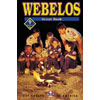
This page has a great description of the Webelos requirements. Click on the Webelos patch.
The Boy Scouts of America Pack
Pack 

 Troutdale, Oregon
Troutdale, Oregon
